Fill in the Java code where it says to in the template Creat
Fill in the Java code where it says to in the template.
Create a package named file_operations and a class named FileOperations which will receive one or more command line pathnames to command files. Each command file will be opened and processed line by line. Each line can contain one of the following commands:
? - This command will print out the legal commands available
createFile - The first string following \"createFile\" will be treated as a filename, and the remaining strings will be written to the file separated by new lines.
printFile - The first string following \"printFile\" will be treated as a filename that will be opened up and printed out to the screen.
lastModified - The first string following \"lastModified\" will be treated as a filename for which we will print out the date when this file was last modified.
size - The first string following \"size\" will be treated as a filename for which we will print out the number of bytes it contains.
rename - The first string following \"rename\" will be treated as the current filename and the second string will be treated as the new filename we desire.
mkdir - The first string following \"mkdir\" will be treated as the name of a directory that should be created.
delete - The first string following \"delete\" will be treated as the name of a file that should be deleted.
list - The first string following \"list\" will be treated as the name of a directory for which we want a list of the files it contains.
quit - exit program
Anything else is a bad command
For a non-existent command file, you would get something like:
For a good command file like cmd.txt
cmd.txt
Your output would look something like:
Here is a template that you can use.
Once you have your program written, I want you to add the following files to the top level of your project and run the test that I request:
cmd1.txt
cmd2.txt
Run your program with the following command line:
cmd1.txt non-existent-file cmd2.txt
Insert the contents of your screen into the appropriate JH2 worksheet.
Please don\'t create a file with the name non-existent-file!!!
Solution
import java.io.File;
import java.io.FileInputStream;
import java.io.FileNotFoundException;
import java.io.FileOutputStream;
import java.io.IOException;
import java.io.PrintStream;
import java.util.Date;
import java.util.Scanner;
import java.util.StringTokenizer;
public class FileOperations {
StringTokenizer parseCommand;
public void delete(File f)
{
if(!fileExists(f)) return;
System.out.println(\"Deleting \" + f);
if (f.delete())
System.out.println(\"Successful delete.\");
else
System.out.println(\"Failed to delete \" + f);
}
public void rename(File fOld, File fNew)
{
// code for handling the rename command
// Make sure you check the return code from the
// File rename method to print out success/failure status
if(!fileExists(fOld)) return;
System.out.println(\"Renaming \" + fOld + \" to \" + fNew);
if(fOld.renameTo(fNew))
System.out.println(\"Successful rename.\");
else
System.out.println(\"Failed to rename \" + fOld);
}
public void list(File f)
{
// code for handling the list command
if(!fileExists(f)) return;
String[] files = f.list();
for (int i = 0; i < files.length; i++) {
System.out.println(files[i]);
}
}
public void size(File f)
{
// code for handling the size command
if(!fileExists(f)) return;
System.out.println(\"Size for \" + f + \" is \" + f.length());
}
public void lastModified(File f)
{
// code for handling the lastModified command
if(!fileExists(f)) return;
long time = f.lastModified();
Date d = new Date(time);
System.out.println(\"Last modified for \" + f);
System.out.println(\"Date: \" + d);
}
public void mkdir(File f)
{
// code for handling the mkdir command
// Make sure you check the return code from the
// File mkdir method to print out success/failure status
if (f.mkdir())
System.out.println(\"mkdir successful: \" + f);
else
System.out.println(\"mkdir failed: \" + f);
}
public void createFile(File f)
{
// code for handling the createFile command
PrintStream ps = null;
try {
if(f.createNewFile()){
System.out.println(\"Created file \" + f);
}
else{
System.out.println(\"Could not create new file.\");
}
ps = new PrintStream(new FileOutputStream(f));
while(parseCommand.hasMoreTokens()){
ps.println(parseCommand.nextToken());
}
}
catch(FileNotFoundException e){
System.out.println(e);
}
catch(IOException e){
System.out.println(e);
}
finally{
if(ps != null) ps.close();
}
}
public void printFile(File f)
{
// code for handling the printFile command
Scanner scan = null;
if(!fileExists(f)) return;
try {
scan = new Scanner(new FileInputStream(f));
while(scan.hasNextLine())
System.out.println(scan.nextLine());
}
catch(FileNotFoundException e) {
System.out.println(\"Command file does not exist:\" + f);
}
finally {
if(scan != null) scan.close();
}
}
void printUsage()
{
// process the \"?\" command
System.out.println();
System.out.println(\"?\");
System.out.println(\"quit\");
System.out.println(\"delete filename\");
System.out.println(\"rename oldFilename newFilename\");
System.out.println(\"size filename\");
System.out.println(\"lastModified filename\");
System.out.println(\"list dir\");
System.out.println(\"printFile filename\");
System.out.println(\"createFile filename\");
System.out.println(\"mkdir dir\");
System.out.println(\"quit\");
}
// useful private routine for getting next string on the command line
private String getNextToken()
{
if (parseCommand.hasMoreTokens())
return parseCommand.nextToken();
else
return null;
}
// useful private routine for getting a File class from the next string on the command line
private File getFile()
{
File f = null;
String fileName = getNextToken();
if (fileName == null)
System.out.println(\"Missing a File name\");
else
f = new File(fileName);
return f;
}
private boolean fileExists(File f){
if(!f.exists()){
System.out.println(\"File does not exist: \" + f);
return false;
}
return true;
}
public boolean processCommandLine(String line)
{
if (line != null) {
parseCommand = new StringTokenizer(line);
String command = getNextToken();
if(command.equals(\"?\")){
System.out.println(\"Processing: \" + command);
printUsage();
System.out.println(\"*****************************\");
return true;
}
else if(command.equals(\"quit\")){
System.out.println(\"Processing: \" + command);
return false;
}
File f = getFile();
System.out.println(\"====>\");
System.out.println(\"Processing: \" + command + \" \" + f);
switch (command) {
case \"delete\":
delete(f);
break;
case \"rename\":
File fNew = getFile();
rename(f, fNew);
break;
case \"list\":
list(f);
break;
case \"size\":
size(f);
break;
case \"lastModified\":
lastModified(f);
break;
case \"mkdir\":
mkdir(f);
break;
case \"createFile\":
createFile(f);
break;
case \"printFile\":
printFile(f);
break;
}
}
else {
System.out.println(\"Bad input command.\");
return false;
}
System.out.println(\"*****************************\");
return true;
}
void processCommandFile(String commandFile)
{
Scanner inputStream = null;
try {
inputStream = new Scanner(new FileInputStream(commandFile));
while(inputStream.hasNextLine() && processCommandLine(inputStream.nextLine()));
}
catch(FileNotFoundException e){
System.out.println(e);
}
finally {
if (inputStream != null)
inputStream.close();
}
}
public static void main(String[] args)
{
FileOperations fo= new FileOperations();
for (int i=0; i < args.length; i++)
{
System.out.println(\"\ \ ============ Processing \" + args[i] +\" =======================\ \");
fo.processCommandFile(args[i]);
}
System.out.println(\"Done with FileOperations\");
}
}

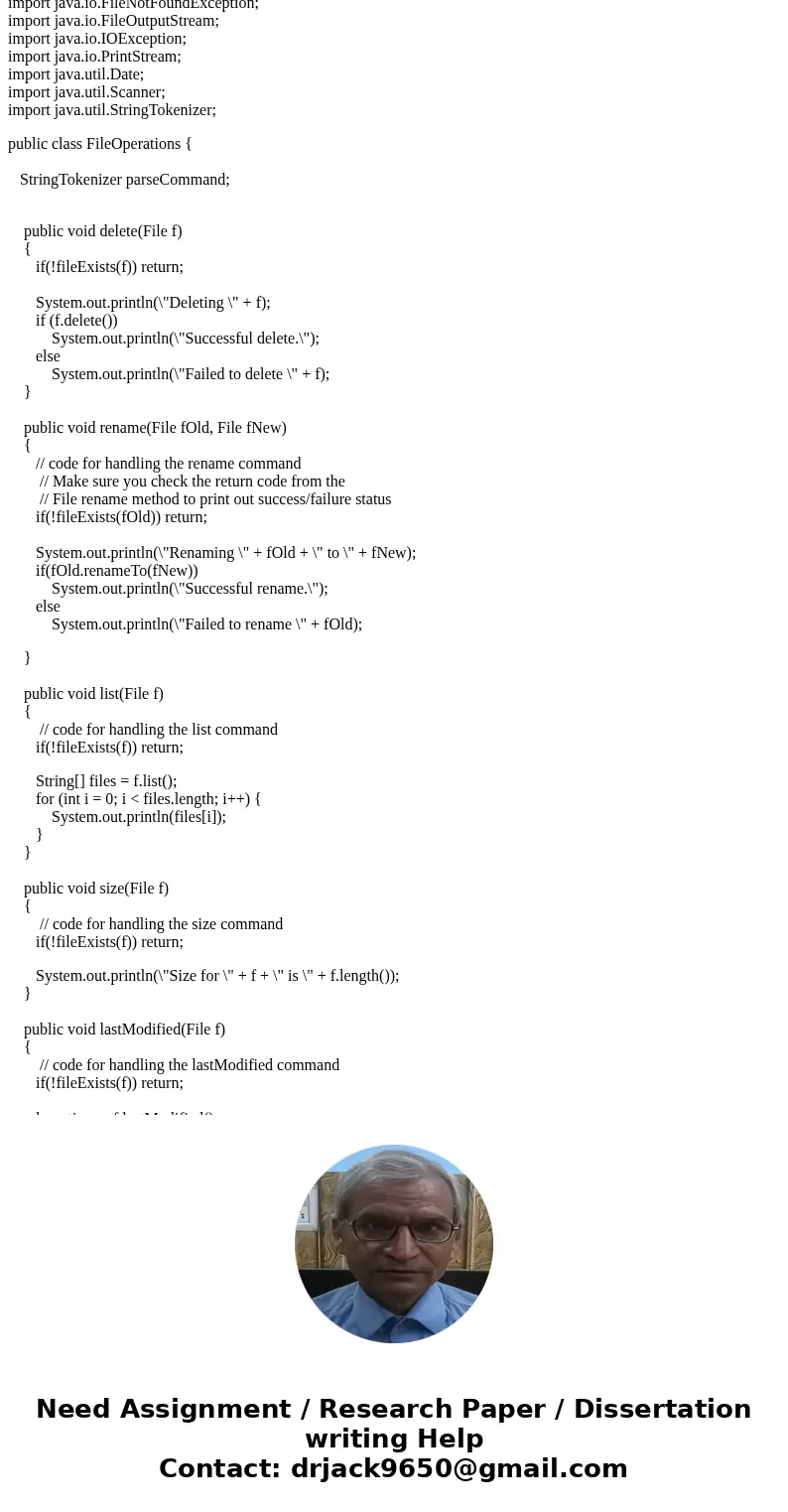
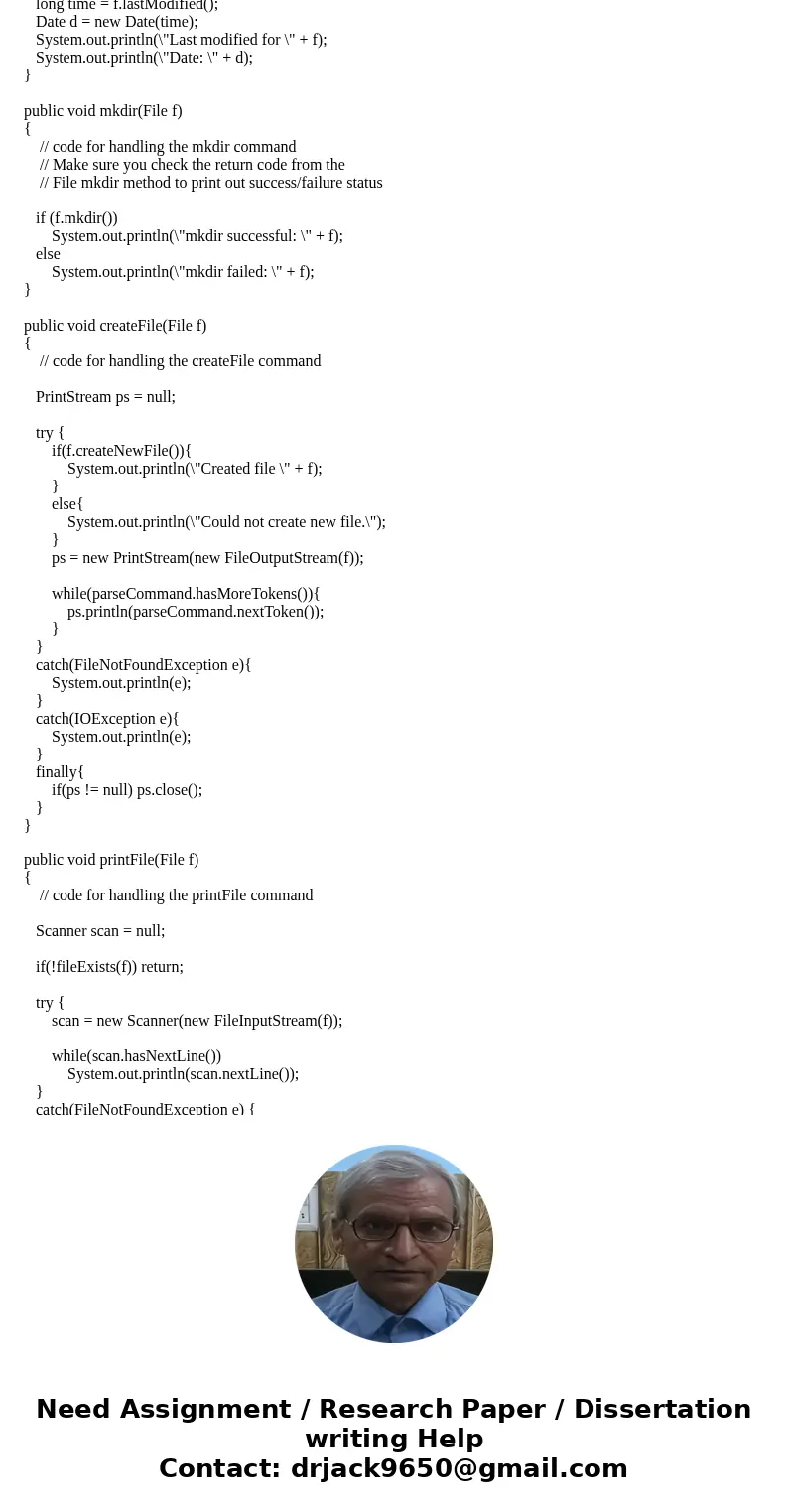
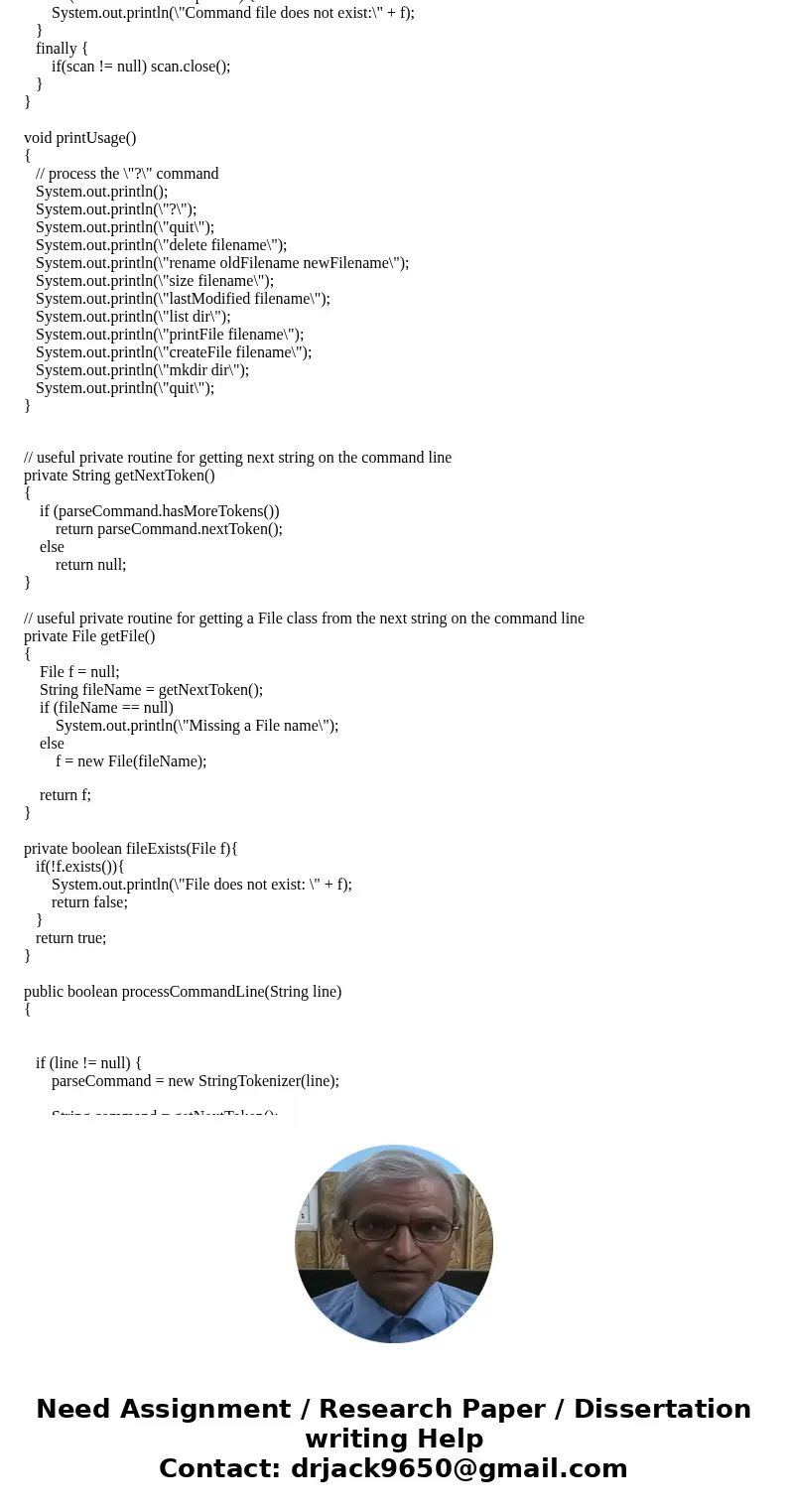
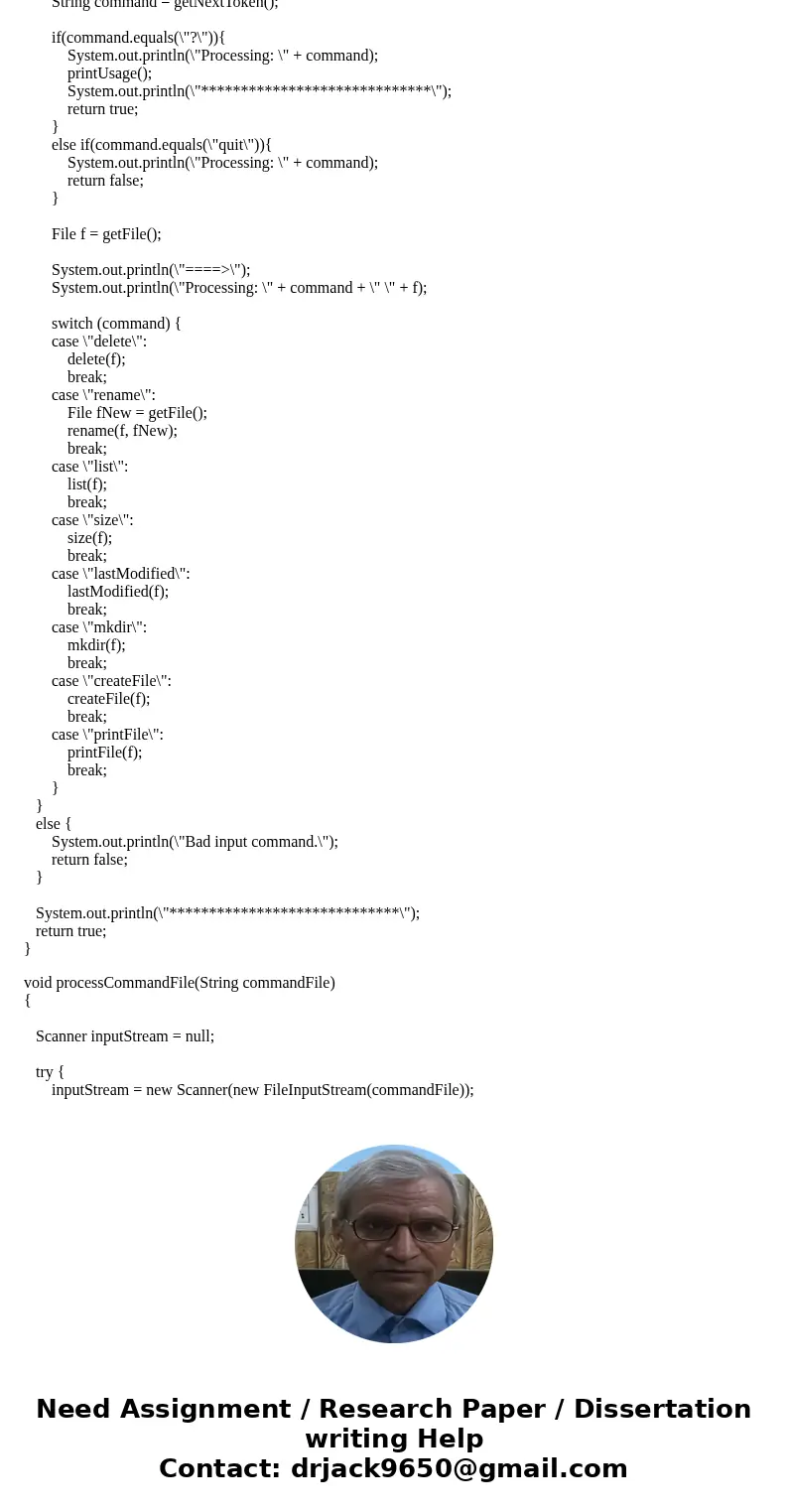
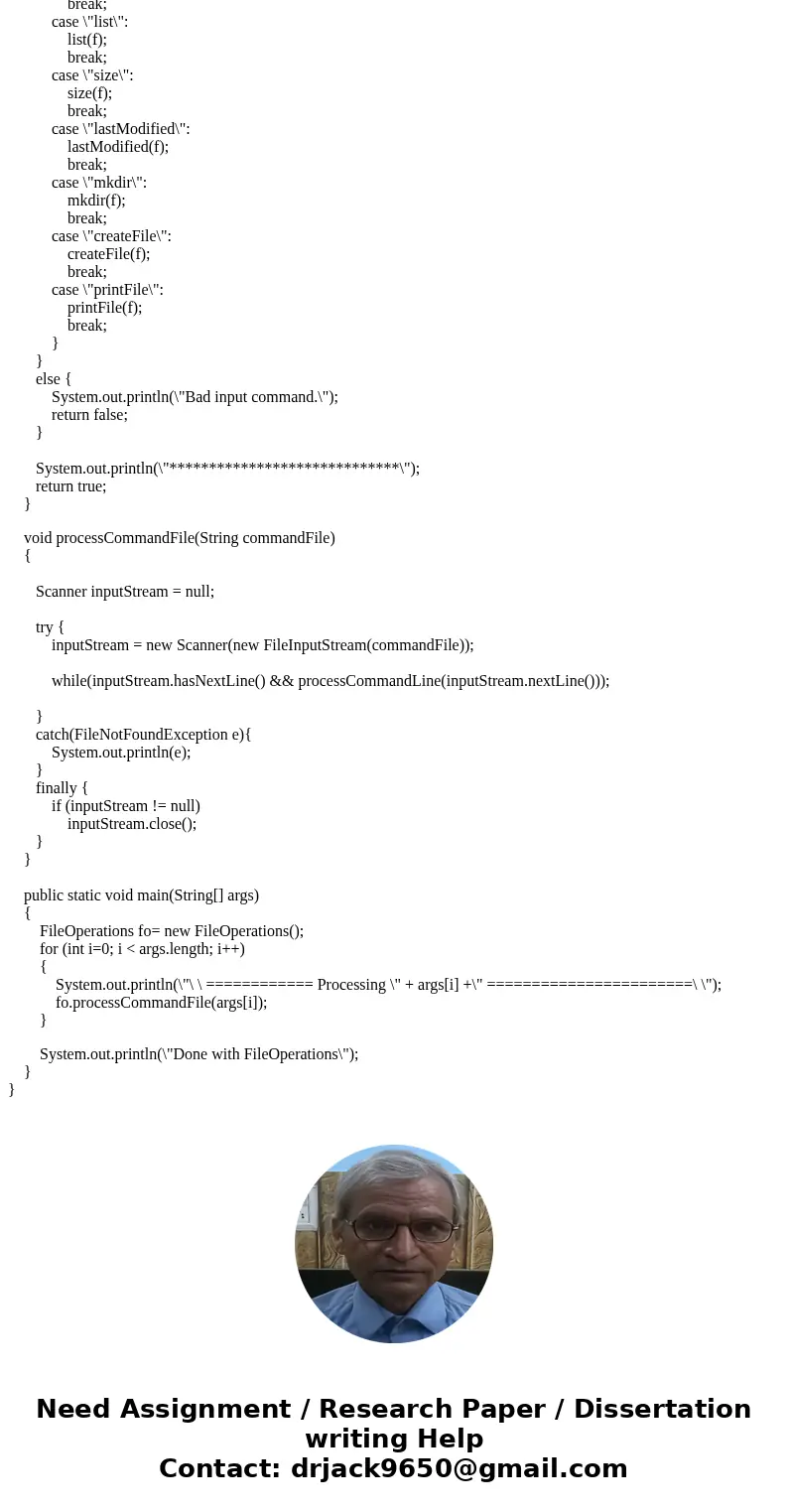
 Homework Sourse
Homework Sourse